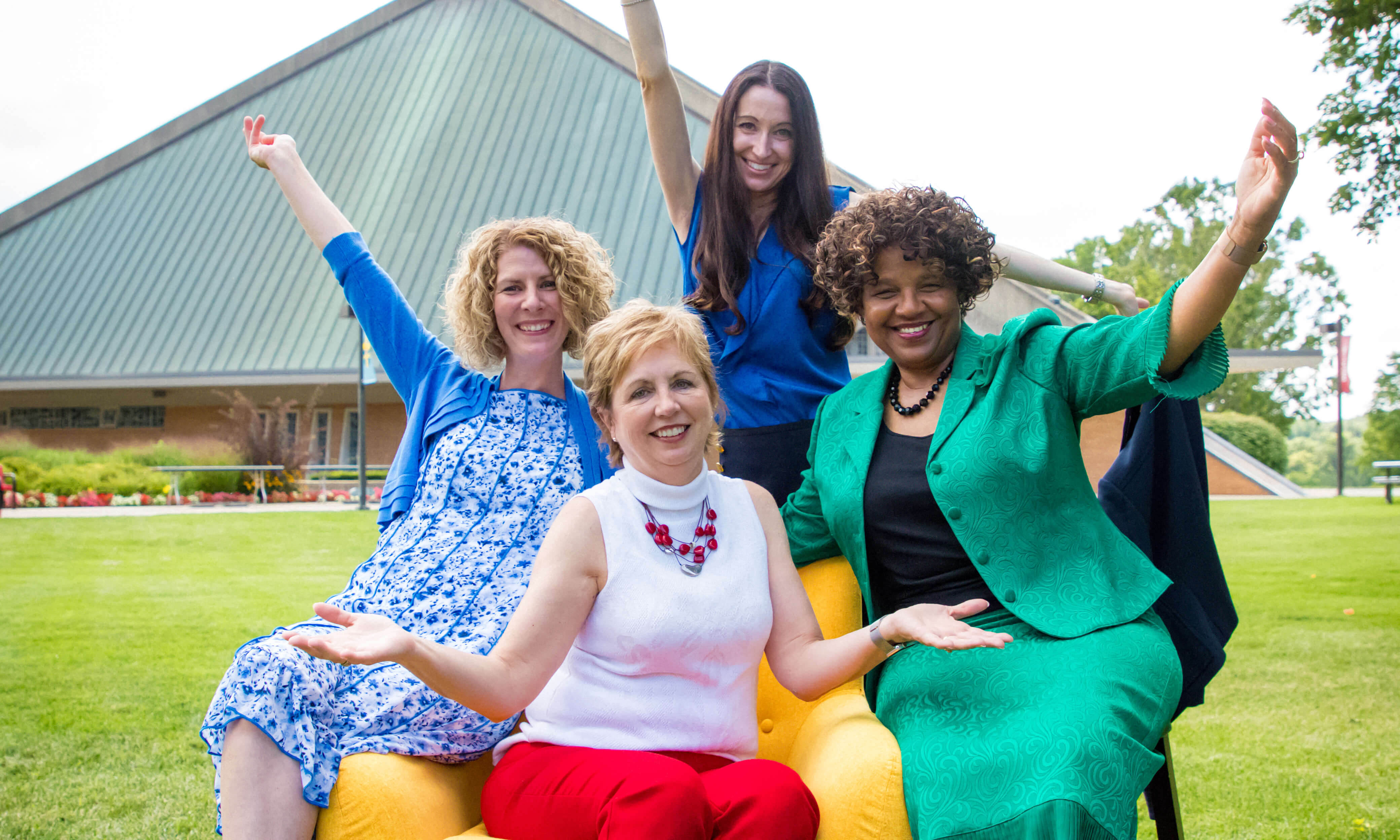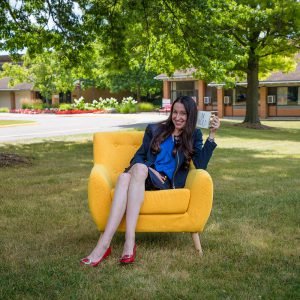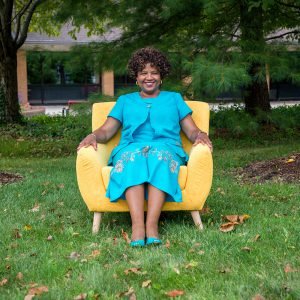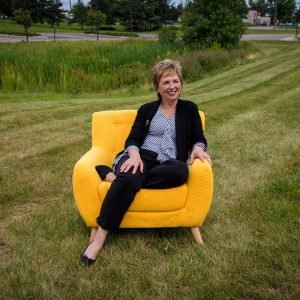
This story first appeared in the fall 2019 issue of the Arbor Light, the official magazine of Concordia University Ann Arbor.
The world of higher education is ever changing. No one understands this high-stakes fluctuation better than the leaders who are entrusted to prepare students for the present world and future-proof their academic programs for generations to come. Meet the accomplished and scholarly women who are leading the academic schools at Concordia University Ann Arbor. While their roles and titles may be traditional, these leaders each break the academic archetype in their own way. Together, they ensure a dynamic learning experience that will uniquely prepare students for uncommon lives of leadership and service.
 Erin Laverick
Erin Laverick
School of Arts and Sciences
Education
- PhD—English, Bowling Green State University
- MA—English, Illinois State University
- BA—English, University Wisconsin– Green Bay
Research/Publications
- Project-Based Learning Multimodal Compositions in First-Year Writing
When you were a kid, what did you want to be when you grew up?
I wanted to be a teacher like my parents and grandpa. One of my earliest memories is of my dad bringing home a beautiful old chalkboard that I could play school with in our basement. I also had old-fashioned sleigh desks and a bulletin board that I liked to rearrange. When my younger brothers lost interest in playing with me I always had my dolls to teach.
Did you receive any recognizable shoulder taps on your journey?
I had a lot of shoulder taps along the way. One of my undergraduate professors recognized something in me and encouraged me to apply to graduate school. She was already a well published scholar, but she would still bring her own work into the class and ask us to review it. That was powerful to me because even she needed other people to review her work and provide feedback. I also thought she was brave to show her vulnerability to her students.
How have you dealt with doubt?
There’s always doubt. Growing up I was always the kid who worked hard, but wasn’t the smartest or most likely to succeed. I think that empowered me to keep going because I have a competitive spirit. Even after all this time and all my degrees I still feel like a fake sometimes. This was especially the case in graduate school when I asked myself questions about being enough: Am I really smart enough? Am I really talented enough?
My husband is an excellent sounding board because he is also a professor. I also have a strong network of colleagues and friends who push and encourage me, and model how to be successful as an educator and as a scholar. While it’s certainly a struggle to do both well, I feel like I’m a better, more empathetic leader. There’s strength in the struggle.
The 2019–20 academic theme is “Embrace(d).” How do you incorporate that into your work?
I love that theme. Especially as we’re looking to increase different populations, like international students, who might not have been exposed to a Concordia before. I’ve worked extensively with international students in a previous position so I understand how difficult it can be for them to step foot on campus and feel like they’re all alone. This theme reminds all of us that it is our calling to fully embrace the uniqueness of each student, and to help them navigate campus life in and out of the classroom so that they can be successful adults.
What does higher education look like in 2030?
As technology continues to grow, the need to have quality conversations is dire. The most important conversation is around the topic of ethics in the world, in technology, in the media. The humanities help people discern the content they’re receiving and what they’re creating. I teach first-year writing and, regardless of the modality, the basics for good communication still apply: 1) Define a solid purpose; 2) Determine a proper context; 3) Identify the target audience; 4) Deliver the clearest, most concise message.
What book is on your nightstand?
A stack of books and a Nook. My favorite genres are memoir and historical fiction. I just finished reading “Born a Crime” by Trevor Noah. It is an amazing read. Noah’s writing is compelling and would speak to many of my students. I especially enjoy books that I can share in the classroom.
Learn more: cuaa.edu/sas
 Suzy Siegle
Suzy Siegle
Haab School of Business Education
- EdD—Higher Education Leadership and Management, Regent University
- JD—Law–small business formation, business consulting/startup, real estate, estate planning, first amendment, Ave Maria School of Law
- MBA—Master of Business Administration, Western Governors University
- BGS—Middle East History, Political Science, Psychology, University of Michigan
Research/Publications
- Entrepreneurship and Innovation in Higher Education Success and the Subconscious Mind
- Neuroscience and Business Locus of Control Psychology for Business and Leadership
When you were a kid, what did you want to be when you grew up?
An innovator. No matter what I focused on as a kid, my through line always had elements of innovation, creativity, and value creation. I went through a period of time when I wanted to explore space and literally break the bounds of what we know to be possible. I also saw business opportunities in absolutely everything—especially adversity. I didn’t know it at the time, but I was building the very framework for my research in the entrepreneurial mindset. I have a passion for helping leaders at every level unlock their potential through intensive personal growth and development practices, identify the behaviors and triggers that might be holding them back. Our professional growth will never outpace our personal growth!
Did you have any recognizable shoulder taps on your journey?
Everything in life has come from a shoulder tap. God has worked through other people to help me grow in different areas, and let me know when I need to work on my own personal development and growth. It might not have always felt great, but I am who I am because of them. I show up differently. Through all the people God put in my path, I’ve had to work on myself to overcome self-doubt, work through conflicts, and meet challenges.
How have you dealt with doubt?
First and foremost, as Christians, we pray for strength and clarity from God. He knows us and what we are capable of. We have to ask ourselves if we are doing what He intended for us to do, what did he put us on this earth to do, and who are we here to serve.
Doubt is directly correlated with a lack of confidence. It is a great indicator that we are moving ahead to the next big stretch in our lives. I remind myself that I will never be confident doing something I have never done or moving beyond my comfort zone until I actually do it. Confidence comes with commitment to do what you say you will do and then the energy that comes with doing it (completion energy). I tell my students all the time that when they feel doubt or a lack of confidence they are moving beyond their comfort zones and can say, “Well, here we go, let’s grow!”
What are the largest challenges our students face?
I would say mindset. Students are facing a changing world with changing expectations. They need to try new things here so that they develop the confidence and connections to enter the job market, and always embrace change and challenge. Of course, this is true for all of us, not just students.
What does higher education look like in 2030?
I don’t even know if we will call it higher education. It will be more like a highly connected community of entrepreneurs, leaders, and students who coach and learn from each other. The future is not fixed; we have an incredible opportunity to help shape the world we want and decide what it will look like in 2020 and 2030!
What book is on your nightstand?
Right now I’m listening to “The Obstacle Is the Way: The Timeless Art of Turning Trials into Triumph” by Ryan Holiday. I mostly do audible books because I can listen every morning when I run, get ready, drive to and from work, etc. I listen to one audible a week (usually on 1.5 or 1.75x speed!)
Learn more: cuaa.edu/business
 Sandra Harris
Sandra Harris
School of Education
Education
- EdD—Educational Leadership, Eastern Michigan University
- Education Specialist, Educational Leadership, Eastern Michigan University
- MA—Guidance and Counseling, Eastern Michigan University
- BBE—Bachelor of Business Education, Eastern Michigan University
Research
- Developing ways to keep students interested in the teaching profession
When you were a kid, what did you want to be when you grew up?
I always knew I wanted to be a teacher.
Did you receive any recognizable shoulder taps on your journey?
I am a first-generation college student. I knew that the teaching profession would require a college education. The encouragement from my fifth grade teacher was a pivotal point in my life. His early “tap” impacted my entire career path. I always remind my students that they have the power to impact peoples’ lives in that same way. Teachers make all professions possible.
How have you dealt with doubt?
That is where my faith came in. I look to Matthew 6:33 and am reminded that when I put God first everything else falls into place. I help students who might be experiencing doubt by sharing my story of hard work and breaking perceived barriers. Like the teacher who saw it in me, I let them know that I believe in them, and remind them that they, too, can be successful and excel in life. I tell them, “I did it; you can do it, too.”
The 2019–20 academic theme is “Embrace(d).” How do you incorporate that into your work?
From the first time I walked on this campus I felt embraced. To be in an atmosphere where we can pray together with our students is refreshing and empowering. We are a family here. Not just this year but every year I embrace students, and say and do things that make them feel wanted, loved, and cared for so they can be the best teachers they can be.
What are the largest challenges our students face?
It’s a real challenge for students to finance their education. Some of our students are nontraditional and come back to school after being out in the workforce for a while. They can’t just quit their jobs and other responsibilities to earn a degree. We’re looking at programs that can meet their needs—like offering more courses online and during the evening—so they can do what they were called to do. The good news is that if they can make it through the program they will find jobs. Both in Michigan and nationally there’s a teacher shortage that we’re striving to help fill.
The teaching criteria are also becoming a challenge. We need to equip and acclimate our students to all different school settings— urban, rural, and international—so they feel prepared to be effective and make an impact on students with backgrounds that are different from theirs.
What book is on your nightstand?
My favorite reads are mystery novels. Currently, I’m reading “The Poet” by Michael Connelly. I also read a chapter or two from the Bible before going to sleep every night.
What are you still curious about?
Travel feeds my curiosity. I’m looking forward to a trip to the Holy Land with a church group next summer. Also on my travel bucket list is a trip to South Africa and Australia.
Learn more: cuaa.edu/education
 Cindy Fenske
Cindy Fenske
School of Nursing
Education
- DNP—Nursing, Oakland University
- MS—Medical-Surgical Nursing, University of Michigan
- BSN—Nursing, Valparaiso University
Research/Publications
- Fenske, C., Watkins, K. & Saunders, T., (2019). Health and Physical Assessment in Nursing
- The impact of simulation on clinical judgment development in pre-licensure nursing students
- Student nurses’ perception of performance compared to actual performance
When you were a kid, what did you want to be when you grew up?
I was always going to be a nurse. I had an aunt who was a nurse, and was intrigued with what she did and how she helped people. Because of her I knew what I wanted to do at an early age.
Did you receive any recognizable shoulder taps on your journey?
I had a professor during my undergraduate studies who demonstrated such competence in the field of nursing and such compassion for her students that I wanted to be just like her. While I always knew that I wanted to become a nurse, she introduced me to the idea that I could teach nursing and, therefore, help even more people through my work. She was approachable, highly motivated, well educated, kind, and caring, yet she also had high expectations for each one of us. She made me want to do my best. Because of her mentorship, I switched from a nursing focus to teaching.
How have you dealt with doubt?
When I had to pursue a doctorate degree or risk losing the job I loved as a university professor, I experienced significant doubt. While there had always been pressure to further my education, a change in leadership made a terminal degree mandatory.
My doctoral colleagues at the time were almost entirely consumed with research, and I knew that wasn’t my path. I didn’t think I could complete the program and that I was cut out for research. I prayed for guidance. I asked the Lord to help me find my path, to literally drop the answer into my lap. He did. No sooner had I finished praying when the right program for me appeared with open slots and on the right start date. He opened up that door for me, and I walked through. If I hadn’t walked through the door, I wouldn’t be here today.
What are the largest challenges our students face?
Because this is a licensure program, our students really have to learn the material. Everything builds. If a student doesn’t understand something fully it becomes detrimental down the road. Most of our students work, and many of them have families and other responsibilities, so a sustained focus can be difficult. We spend extra time with them and provide additional simulation opportunities when needed to help them stay on track. Sometimes the answer is that they take a semester off. The nice thing about our program is that every class is offered every semester so they can jump right back in when they’re ready.
What does higher education look like in 2030?
In nursing it means more and more simulated practice with higher fidelity to make experiences as realistic as possible. Not only does this emphasis provide them with applicable experience, but it also allows us to create authentic settings, like a hospital room, an apartment, the emergency department, and a clinic, in which our students have to practice communicating with patients, staff, family, and other practitioners confidently and correctly.
What are you still curious about?
I am curious about how we can help students develop clinical judgment skills at a more rapid rate. The research into clinical judgment development shows that there are many factors that foster it, one of which is experience and practice. I’m interested to study if the additional practice our students receive in simulation has an effect on accelerating its development.
Learn more: cuaa.edu/nursing
The fall 2019 Arbor Light hit mailboxes the beginning of October. View a PDF version of the magazine here. If you are not on our mailing list, but are interested in receiving a free copy, call 734-995-7317 or send us an email.
—
If this story has inspired you, why not explore how you can help further Concordia's mission through giving.